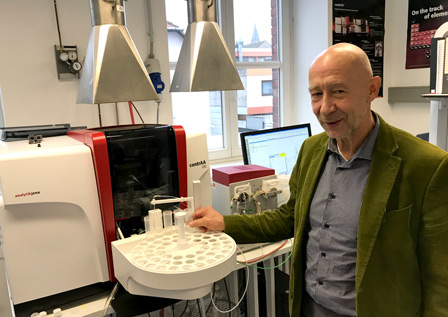News
Success Stories: “We are absolutely delighted with this fine example of successful cooperation”
We talked with Prof. Dr. Thomas P. Knepper, Vice President of Hochschule Fresenius of Applied Sciences and director of the Institute for Analytical Research (IFAR), about the advantages of a collaboration between universities and industry.
Analytik Jena: How long have Hochschule Fresenius and Analytik Jena AG worked together?
Prof. Dr. Thomas Knepper (TK): The cooperation was established in 2013. In September 2016, we established an application center for customers as well as for teaching and research at the university’s campus in the Hessian town of Idstein, Germany.
How did Hochschule Fresenius decide to work with Analytik Jena?
TK: Everything was initially set in motion by Oliver Büttel, a graduate of Hochschule Fresenius who was then a product manager at Analytik Jena. The opportunity for a company to work with a university of applied sciences was welcomed. The cooperation gives pupils, trainees, and students, as well as academic staff the opportunity to test the application of methods on the state-of-the-art devices. This allows them to keep up with the latest technical developments and become familiar with current practices. On the other hand, this is naturally a multiplication factor for their future positions at research labs in the chemical industry.
What are the advantages of cooperating with Hochschule Fresenius?
TK: The availability of measurement time is a decisive factor for us. Analytik Jena also supports us by maintaining our equipment. It is obviously wonderful that the instruments are always in working order. The cooperation also ensures that Hochschule Fresenius always has access to the most modern devices, including prototypes. Likewise, the joint discussion of new applications helps us establish new methods. We are very fortunate to be permanently on the cutting edge of technology.
The symbiosis of industrial application and academic research offers students as well as trainees enormous advantages on the job market. They will have already worked with state-of-the-art devices and methods during their training. State-of-the-art devices play a considerable role, especially when it comes to software and current analysis possibilities. These topics are better learned through application than from books. Students therefore often write bachelor’s and master’s theses on topics related to data analysis or digital visualization of measurement results.
Which projects, research, and applications do you conduct using Analytik Jena equipment at the campus in Idstein?
TK: We work in different areas of application such as food safety, food analysis, forensics, and environmental and product analysis. We partially also work on pharmaceutical applications such as the validation and establishment of new methods in pharmacopoeia.
Another big topic is quality assurance. We take multiple measurements, comparing devices with an eye on results. This validates them and helps students learn the advantages of one device over another.
We use the equipment to conduct research on different levels for job training and academic research – from undergraduate studies to the doctoral level.
Would you like to build on this cooperation? What would you like to see happen?
TK: Definitely. We are absolutely delighted with this fine example of successful cooperation. We have already achieved a great deal in the area of instrumental inorganic analysis. We can also envision closer cooperation in the area of Life Science. There is an enormous need for training in the area where chemistry and biology overlap, which we can satisfy. We would naturally love to have a competent analytics company like Analytik Jena on reserve.
Our dream would also be to support new developments in early stages, and to include our students’ ideas in the engineering.
Prof. Dr. rer. nat. Thomas P. Knepper is Vice President of Research and Research Development as well as an authorized signatory of Hochschule Fresenius. As professor of chemistry and biology, he conducts research in water analysis and technology. Dr. Knepper is the founder and director of the Institute for Analytical Research (IFAR) and a main initiator and promoter of innovation at Hochschule Fresenius.
For more information regarding our cooperation, please visit the Hochschule Fresenius website.

„The opportunity for a company to work with a university of applied sciences was welcomed. The cooperation gives pupils, trainees and students as well as academic staff the opportunity to test the application of methods on the state-of-the-art devices."

